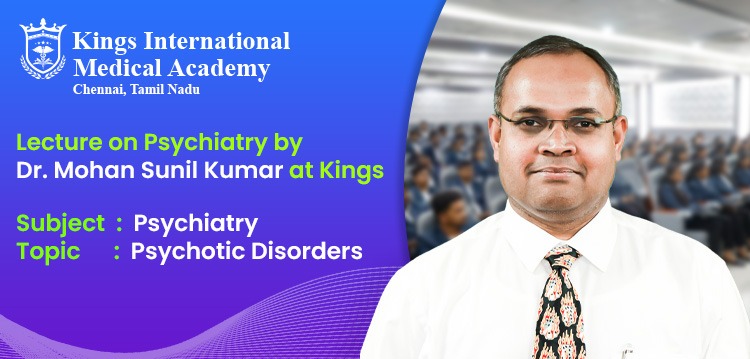
Lecture on Psychiatry by Dr. Mohan Sunil Kumar at Kings International Medical Academy
Kings International Medical Academy is renowned for offering excellent FMGE coaching classes, and this time, we have the privilege of having Dr. Mohan Sunil Kumar as a faculty member for our FMGE students. As an experienced Psychiatrist, Dr. Kumar's lecture on Psychiatry was insightful, and our students were fully engaged throughout. In this blog, we will delve deeper into the topic of Psychotic Disorders.
PSYCHOTIC DISORDERS
Psychotic symptoms
1- Delusions
2. Hallucinations
3. Disorganized behaviour
4. Formal thought Disorder
5. Catatonia
6. Talking to self
7. Personality change
Primary Psychotic Disorder
Secondary psychotic Disorder / Mood congruent
SCHIZOPHRENIA - Eugen Bleuler
4 A's:
Emil Kraepelin – Psychosis
Kurt Schneider
1.Auditory
2.Thought phenomena
3.Made phenomena - Impulse, Volition, Affect
a) Somatic passivity - Delusion of control
b) Primary delusional Experience
Negative symptoms
Van Gogh - Schizophrenia + Self-Mutilation
Pfropf - Schizophrenia - Mental Retardation
Chances of getting:
General – 1%
3° Relative – 2%
2° Relative - 3%
1° Relative – 10%
Both parents – 40%
Monozygotic Twins - 47%
Dizygotic Twins – 10%
| Schizophrenia Prognosis | |
| Good vs. Bad | |
| Good prognostic factor(s) | Bad prognostic factor(s) |
| Later onset Presence of precipitating factors Acute onset Well-adjusted premorbid status Prominent mood symptoms Compliance and tolerating medications Family and emotional support Family history of mood disorder Positive symptoms | Young and insidious onset No precipitating factors Poor premorbid functioning Family history of Schizophrenia Negative symptoms Neurological signs/symptoms History of perinatal trauma History of assaultive behaviour No remissions in 3 years / many relapses |
Antipsychotics
Also works on serotonin receptors
1. Sedation
2. Height gain
3. Dyslipidemia
4. Hyperglycemia
5. Metabolic toxicity
Dopamine pathways
Extrapyramidal symptoms:
1. Acute
MC – Akathesia
Acute Dystonia
Orolingual dystonia
Torticollis
Laryngeal dystonia
Occulogyric crisis
2. Chronic
Tardive
Rabbit S°
3. Lethal
Neuroleptic malignant syndrome